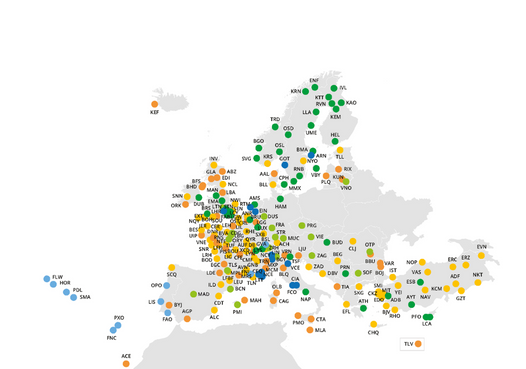Airport climate action results in Europe beat all expectations

Over 200 European airports engaged in climate action within Airport Carbon Accreditation, the global carbon management standard for airportsEuropean airports outperform both the global growth and carbon savings rates
Brussels: Following the release of the Airport Carbon Accreditation Annual Report 2021-20221 today, European progress made within the global carbon standard for airports emerged as the standout star.
Having originated in Europe in 2009, the programme has consistently seen robust growth in participation of European airports year after year. In the period covered by the newly published Report, European airports outperformed the global growth factor with a 32% increase in participation numbers, reaching 204 accredited airports at the end of the programme year (May 2021-May 2022). Airports of all sizes, profiles and locations are counted in this number, including busy international hubs, such as London-Heathrow, Paris-CDG and Istanbul; almost all airports serving European capitals, amongst them Ljubljana, Zagreb, Madrid, Brussels, Oslo and Bucharest; all the way through to smaller, regional and business aviation airports, including Montpellier, Stuttgart and Farnborough. This momentum for airport climate action accelerated in spite of the hampered progress of the COVID-19 recovery in the European region during the period covered.
Airports in Europe have also topped the ranking of the highest number of airports at the more advanced levels of accreditation – Levels 3+ (Neutrality) and 4/4+ (Transformation/Transition), with 68 airports in the region holding accreditation at these levels by the end of the reporting year out of the 89 holding it globally. These levels require airports to align their carbon management and reduction trajectory with the objectives of the Paris Agreement, according to which global warming should be limited to below 2⁰C and ideally 1.5⁰C. Their creation back in July 2019 marked a step-change in the programme’s ambition level, laying the ground to accompany airports of all sizes and locations to reach Net Zero CO2.
European airports also outperformed the global average in carbon performance, registering a -11.9% reduction in Scope 1 and 2 CO2 emissions compared to the global reduction rate of -8.1%. The total reduction achieved amounted to -242,626 tonnes of CO2. This amount is equivalent to the CO2 emitted during the production of close to 36 million cotton t-shirts2.
Kurt Vandenberghe, Director General, DG Climate Action, European Commission commented: “It is important that all parts of the economy take action to tackle climate change and reduce their emissions. We welcome that airports are proactive in reducing their own emissions. Airports acting to reduce their climate impacts are showing outstanding action from their place within a sector that will only become more and more visible in terms of its impacts on climate change. Airport Carbon Accreditation, by having airports work their way up through multiple levels of certification, brings together individual efforts and leads to significant actual emissions reduction collectively. The programme has had a leadership effect, as airlines, air traffic controllers, retailers, passengers, and surface transport and other companies at airports are now also getting involved to lower their climate emissions on the ground.
I congratulate ACI EUROPE on the momentum they have achieved – a credible industry-led climate change initiative that began in Europe, and which has now expanded to bring broader action from airports across the Globe.”
Olivier Jankovec, ACI EUROPE Director General said: “Against a challenging backdrop of a stop-start COVID-19 recovery and volatile operating environment, I am delighted by the ongoing momentum for airport climate action demonstrated in the results published today. European airports are leaders in carbon management globally, leaving no stone unturned in the effort to rid their infrastructure and operations of carbon, in line with the global climate goals and the ambitious climate agenda spearheaded by the EU.”

